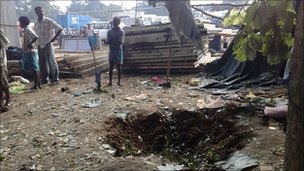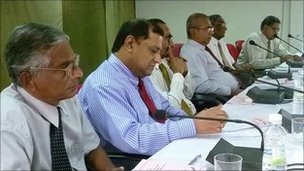 A government inquiry into Sri Lanka’s civil war is "flawed at every level", providing no accountability for atrocities, says a new report.
A government inquiry into Sri Lanka’s civil war is "flawed at every level", providing no accountability for atrocities, says a new report.
The commission has not properly pursued allegations of war crimes committed by the army and Tamil Tiger rebels, says the Amnesty International report.
The rebels were defeated in 2009 in a hard-fought end to their two-decade separatist war.
The government has yet to respond to the allegations.
 But it has repeatedly argued that its forces behaved with complete discipline in the last months of the war.
But it has repeatedly argued that its forces behaved with complete discipline in the last months of the war.
It has also dismissed the idea of an international inquiry into the latter stages of the conflict as a waste of time.
The Amnesty report says it exposes the shortcomings of the inquiry carried out by Sri Lanka’s Lessons Learnt and Reconciliation Commission (LLRC).
"The Sri Lankan government has, for almost two years, used the LLRC as its trump card in lobbying against an independent international investigation," said Amnesty’s Asia Pacific Director Sam Zarifi ahead of the launch of the report – entitled When will they get justice? Failures of Sri Lanka’s Lessons Learnt and Reconciliation Commission.
"Officials described it as a credible accountability mechanism, able to deliver justice and promote reconciliation. In reality it’s flawed at every level: in mandate, composition and practice."
Enforced disappearances
The LLRC was established by President Mahinda Rajapaksa in May 2010, after he made a joint commitment to an accountability process in Sri Lanka alongside UN Secretary General Ban Ki-moon.
But Amnesty says the commission’s mandate falls far short of international standards for such inquiries and that it has "failed to appropriately investigate credible allegations of systematic violations by both sides to the conflict".
It says that these crimes include illegal killings and enforced disappearances, widespread shelling of civilian targets such as hospitals and the use of civilians as human shields.
The human rights group says that commissioners on the LLRC include former government officials who have publicly defended it against allegations of war crimes.
The LLRC published an interim report in September and will submit its final report in November.
"It is the latest in a long line of failed domestic inquiries. Impunity has been the rule rather than the exception, now exacerbated by a post-conflict triumphalism that rejects all responsibility for abuses carried out by government forces," said Mr Zarifi.
"Only an international, independent investigation can deliver justice to the thousands of victims of Sri Lanka’s brutal conflict."
But this option was recently ruled out by External Affairs Minister GL Peiris who recently said in Colombo that it was unreasonable for the international community "to expect a complete remedy for all issues in the short span of two-and-a- half years since the Lankan conflict ended".
(For updates you can share with your friends, follow TNN on Facebook and Twitter )
